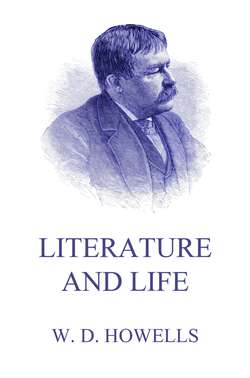Читать книгу Literature And Life - William Dean Howells - Страница 10
На сайте Литреса книга снята с продажи.
V.
ОглавлениеUnder the ‘regime’ of the great literary periodicals the prosperity of literary men would be much greater than it actually is if the magazines were altogether literary. But they are not, and this is one reason why literature is still the hungriest of the professions. Two-thirds of the magazines are made up of material which, however excellent, is without literary quality. Very probably this is because even the highest class of readers, who are the magazine readers, have small love of pure literature, which seems to have been growing less and less in all classes. I say seems, because there are really no means of ascertaining the fact, and it may be that the editors are mistaken in making their periodicals two-thirds popular science, politics, economics, and the timely topics which I will call contemporanics. But, however that may be, their efforts in this direction have narrowed the field of literary industry, and darkened the hope of literary prosperity kindled by the unexampled prosperity of their periodicals. They pay very well indeed for literature; they pay from five or six dollars a thousand words for the work of the unknown writer to a hundred and fifty dollars a thousand words for that of the most famous, or the most popular, if there is a difference between fame and popularity; but they do not, altogether, want enough literature to justify the best business talent in devoting itself to belles-lettres, to fiction, or poetry, or humorous sketches of travel, or light essays; business talent can do far better in dry goods, groceries, drugs, stocks, real estate, railroads, and the like. I do not think there is any danger of a ruinous competition from it in the field which, though narrow, seems so rich to us poor fellows, whose business talent is small, at the best.
The most of the material contributed to the magazines is the subject of agreement between the editor and the author; it is either suggested by the author or is the fruit of some suggestion from the editor; in any case the price is stipulated beforehand, and it is no longer the custom for a well-known contributor to leave the payment to the justice or the generosity of the publisher; that was never a fair thing to either, nor ever a wise thing. Usually, the price is so much a thousand words, a truly odious method of computing literary value, and one well calculated to make the author feel keenly the hatefulness of selling his art at all. It is as if a painter sold his picture at so much a square inch, or a sculptor bargained away a group of statuary by the pound. But it is a custom that you cannot always successfully quarrel with, and most writers gladly consent to it, if only the price a thousand words is large enough. The sale to the editor means the sale of the serial rights only, but if the publisher of the magazine is also a publisher of books, the republication of the material is supposed to be his right, unless there is an understanding to the contrary; the terms for this are another affair. Formerly something more could be got for the author by the simultaneous appearance of his work in an English magazine; but now the great American magazines, which pay far higher prices than any others in the world, have a circulation in England so much exceeding that of any English periodical that the simultaneous publication can no longer be arranged for from this side, though I believe it is still done here from the other side.
